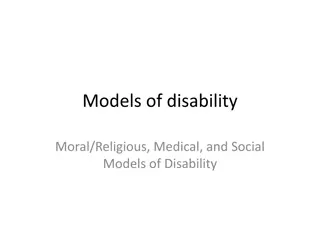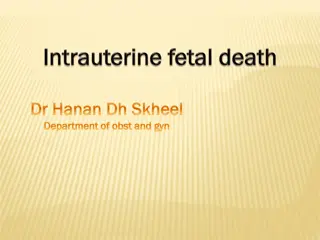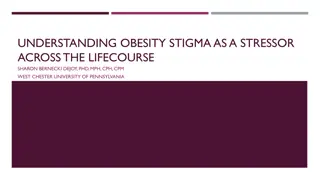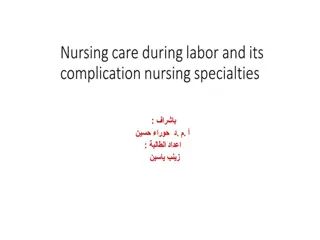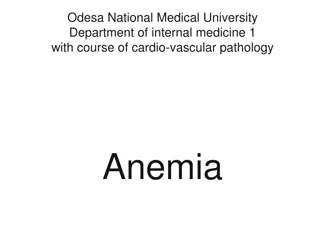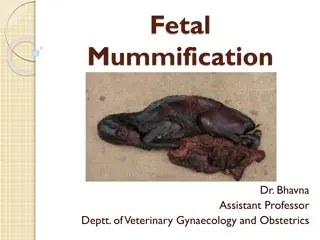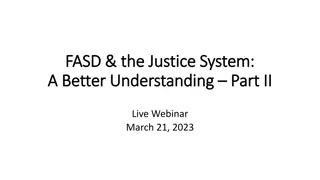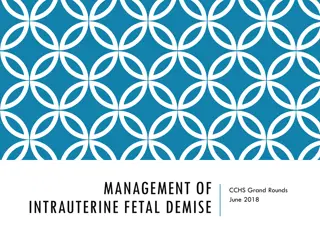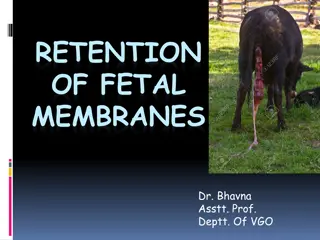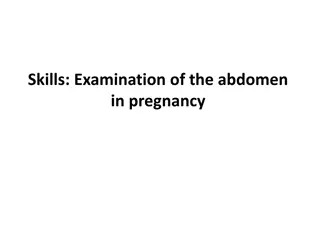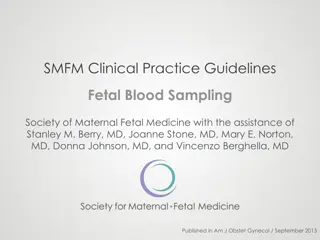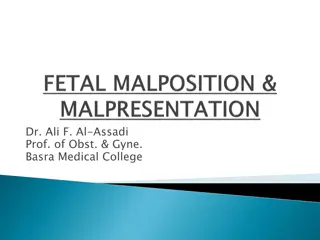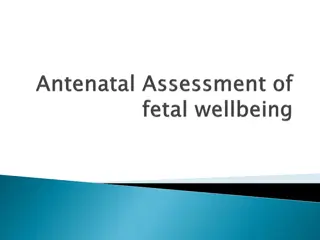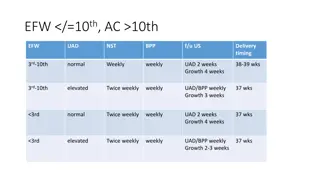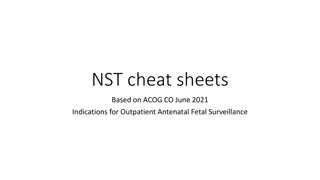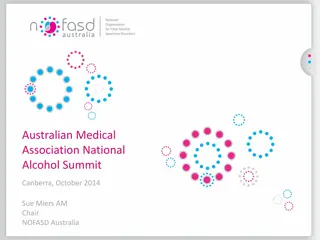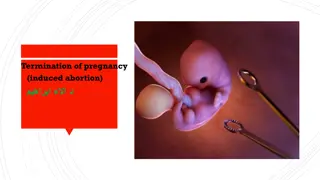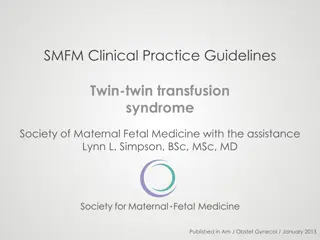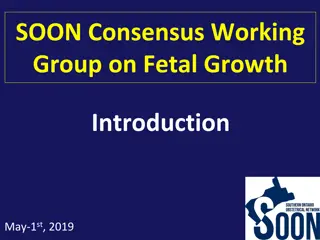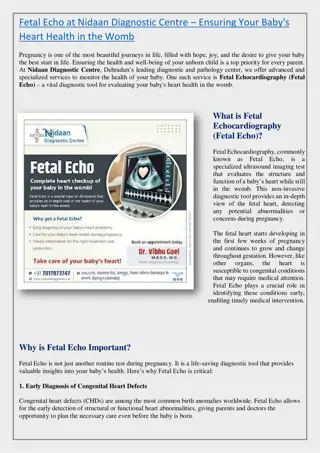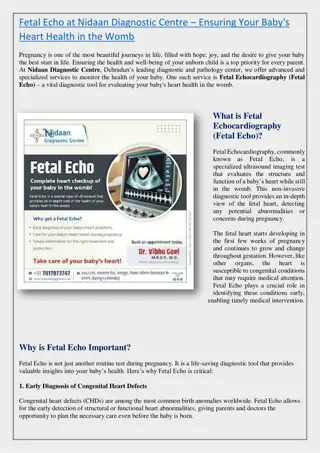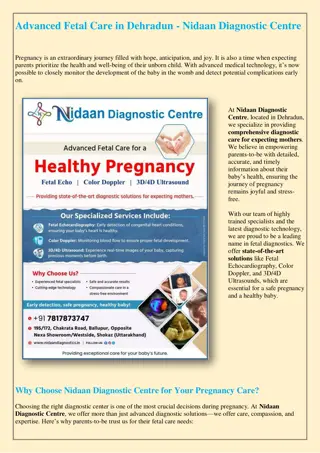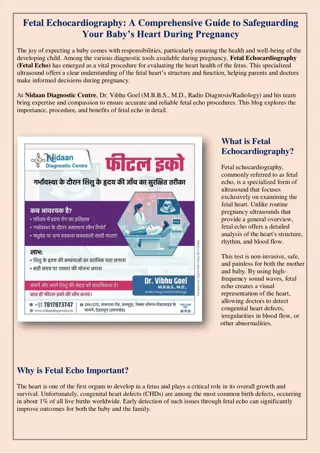Models of Disability: Moral, Medical, and Social Perspectives
The concept of disability is explored through moral/religious, medical, and social models. Impairment refers to a loss or abnormality in structure or function, while disability is a restriction in performing activities. The discussion also delves into the significance of person-first language and th
1 views • 35 slides
Stillbirth: Causes, Symptoms, and Investigations
Stillbirth, the delivery of a baby with no signs of life after 20 completed weeks of pregnancy, can have profound emotional and social effects. Unexplained causes account for 50% of cases, with fetal, placental, and maternal factors contributing. Risk factors include obesity, maternal age, smoking,
2 views • 26 slides
Maternal and Fetal Complications of Obesity in Pregnancy
Understanding the impact of obesity stigma as a stressor throughout the lifecourse is essential, especially concerning pregnancy. The prevalence of pre-pregnancy overweight and obesity poses significant risks, leading to various maternal complications like gestational diabetes, cesarean delivery, an
0 views • 62 slides
NGS and Fetal Fraction in Prenatal Screening
Next Generation Sequencing (NGS) plays a key role in prenatal testing by analyzing cell-free DNA (cfDNA) to determine fetal fraction and detect genetic anomalies like Down syndrome. The process involves DNA extraction, library construction, barcode labeling, sample pooling, quantification, and seque
1 views • 13 slides
Promoting Fetal & Maternal Health: Key Objectives & National Health Goals
This lecture by Assist. Prof. Dr. Hawraa Hussein Ghafel focuses on promoting fetal and maternal health through various aspects such as health behaviors, nursing processes, and health promotion during pregnancy. Key topics include identifying national health goals, assessing pregnant women, planning
1 views • 45 slides
Common Labor Complications and Management Options
Labor and birth processes are typically straightforward, but complications can arise, such as failure to progress, fetal distress, excessive bleeding, malposition, prolapsed umbilical cord, cephalopelvic disproportion, and uterine rupture. Management strategies include rupturing membranes, pain reli
1 views • 24 slides
Red Blood Cell Abnormalities in Anemia: A Detailed Overview
This in-depth article delves into the various types of red blood cell abnormalities seen in anemia, such as anisocytosis, poikilocytosis, spherocytes, ovalocytes, acanthocytes, codocytes, drepanocytes, and stomatocytes. It explains the characteristics of each abnormality, their significance in diffe
1 views • 45 slides
Fetal Mummification in Domestic Animals
Failure in pregnancy stages can lead to fetal mummification, characterized by autolytic changes, mummification process, and dry, leathery tissue. Events required for mummification include fetal death post-bone development, rapid resorption of fluids, absence of oxygen and bacteria. This process is c
2 views • 27 slides
Intrauterine Growth Retardation: Causes, Diagnosis, and Management
Intrauterine growth restriction (IUGR) refers to poor fetal growth in the womb, often due to maternal factors or inadequate oxygen supply. This condition can lead to increased risks for the baby. Topics covered include definition, incidence, normal fetal growth, stages, causes, diagnosis, and manage
1 views • 50 slides
Fetal Movement Counts: Importance, Timing, and Tracking Methods
Fetal movement counts, also known as kick counts, are essential for monitoring your baby's well-being during pregnancy. This article explains the significance of kick counts, when to do them, and how to track fetal movements effectively. Learn why kick counts are crucial, when to start counting, and
0 views • 6 slides
Fetal Alcohol Spectrum Disorder (FASD) in the Justice System
Explore the complexities of Fetal Alcohol Spectrum Disorder (FASD) and its intersection with the justice system. Topics include FASD terminology, interpreting diagnoses, implications in court proceedings, and more. Gain insights into the challenges and considerations surrounding FASD-affected indivi
2 views • 14 slides
Socio-Cultural Factors of Abnormal Behavior in Psychology
Exploring the impact of socio-cultural factors on abnormal behavior, this article delves into the influence of societal pressures, cultural norms, and economic status on mental health. The socio-cultural model emphasizes how societal criteria shape perceptions of abnormality, highlighting the role o
0 views • 7 slides
Management of Intrauterine Fetal Demise: Case Study and Clinical Course
This case study delves into the management of intrauterine fetal demise in a 41-year-old gravida with a history of minimal prenatal care. The patient presented with crowning and underwent a spontaneous vaginal delivery of a non-viable fetus, followed by post-delivery complications and interventions.
0 views • 32 slides
Retention of Fetal Membranes in Veterinary Obstetrics
Retention of fetal membranes, a common issue during the third stage of labor, has significant consequences for animals, especially cattle. Causes include insufficient expulsive efforts and placental issues. The incidence ranges from 6.8% to 50%, often associated with dystocia and twin births. Factor
0 views • 25 slides
Abdominal Examination in Pregnancy: Techniques and Objectives
Examination of the abdomen in pregnancy involves assessing various aspects such as determining gestational age, measuring symphysis-fundus height, evaluating fetal lie and presentation, checking liquor amount, listening to fetal heart sounds, and monitoring fetal movements. The process includes gene
1 views • 38 slides
Normal and Abnormal Behavior: Perspectives and Definitions
Normal behavior varies from person to person and society, influenced by individual preferences and societal norms. Abnormal behavior is characterized by an inability to function effectively or personal discomfort. The concept of normality and abnormality in psychology raises complex questions about
3 views • 8 slides
Voluntary Manslaughter and Diminished Responsibility in Criminal Law
Voluntary manslaughter is a legal concept where certain special defenses can reduce a murder charge to manslaughter, giving judges discretion in sentencing. Diminished responsibility, introduced by the Homicide Act, allows individuals suffering from abnormal mental functioning during a killing to ha
0 views • 23 slides
Guidelines for Fetal Blood Sampling by Society for Maternal Fetal Medicine
Review of guidelines by the Society for Maternal Fetal Medicine on indications, risks, and recommendations for fetal blood sampling. Recommendations include using FBS for severe fetal anemia/thrombocytopenia, cautioning against unnecessary invasive testing, counseling patients about potential risks,
3 views • 14 slides
Abnormal Psychology and Treatment
Explore the world of abnormal psychology and treatment through a variety of engaging activities, discussions, and role-plays. Delve into topics like defining abnormality, different causes of mental illness, and various treatment approaches. Join in to enhance your understanding of mental health diso
0 views • 56 slides
Fetal Pig Dissection Lab: Observing External Features and Respiratory System
In this detailed lab report on fetal pig dissection, students are tasked with observing the external features of the pig, determining its gender, examining teeth and skin, and studying the importance of the umbilical cord. The lab also delves into the respiratory system, focusing on cartilage rings,
0 views • 24 slides
Fetal Malposition and Presentation in Obstetrics
Fetal malposition and malpresentation are important considerations in obstetrics. Malposition involves the fetal head presenting in a non-ideal position, while malpresentation refers to cases where the head is not the presenting part. Detecting these conditions through various signs and examinations
0 views • 16 slides
Occipito-Posterior Position of the Fetal Head
Occipito-posterior position of the fetal head occurs when the head is in one of the oblique diameters with the occiput directed posteriorly. It can be categorized into Right Occipito-Posterior Position (ROP) and Left Occipito-Posterior Position (LOP), affecting 13% of vertex presentations. Causes in
0 views • 32 slides
Occipito-Posterior Position of the Fetal Head
Occipito-posterior position refers to the fetal head being directed towards the back of the pelvis. This positioning can occur to the right (ROP) or left (LOP) side. It occurs in 13% of vertex presentations and may be caused by factors like pendulous abdomen, pelvic brim shape, or sacral alignment.
0 views • 31 slides
Antenatal Assessment for Fetal Health Monitoring
There is a growing focus on antenatal assessment to prevent fetal deaths, with a decline in maternal mortality rates worldwide. The primary goal is to ensure fetal well-being, screen high-risk factors, and detect congenital abnormalities early on. Various tests like Maternal Serum Alpha-Fetoprotein
0 views • 39 slides
The Anatomy of the Fetal Skull
The fetal skull is a bony cavity that protects the delicate brain and plays a crucial role in the birthing process. This detailed guide explores the composition of the fetal skull, including the bones, sutures, fontanels, regions, and landmarks. Understanding these aspects is essential for assessing
0 views • 18 slides
Maternal-Fetal Medicine: Diagnosis & Management of Fetal Growth Restriction
This information provides guidelines for monitoring fetal growth based on estimated fetal weight, abdominal circumference, uterine artery Doppler, non-stress test, and biophysical profile. It outlines strategies for surveillance, including frequency and types of tests based on gestational age and gr
0 views • 5 slides
Antenatal Fetal Surveillance Recommendations Based on ACOG Guidelines June 2021
These cheat sheets outline the indications and recommendations for outpatient antenatal fetal surveillance, including the reasons and frequency for non-stress tests (NST) and biophysical profile (BPP) based on various maternal conditions and fetal considerations. Guidelines are provided for differen
0 views • 4 slides
Unveiling the Roots of "Mal" and "Male": Exploring Words Associated with Badness
Delve into the origins and meanings of the terms "mal" and "male" as they relate to negative connotations like badness, abnormality, and wrongdoing. Uncover words like malfeasance, malnourished, malefactor, and more that shed light on various aspects of bad behavior and health conditions.
0 views • 24 slides
Pediatric Ankle and Knee Pain Imaging Findings
Images show calcifications in Achilles tendon and deep to plantar fascia in a 7-year-old with ankle pain, as well as a cortical abnormality in the distal femur of a 16-year-old girl presenting with knee pain. The significance of these findings requires further evaluation by a medical professional.
0 views • 6 slides
Fetal Alcohol Spectrum Disorder (FASD) and Supporting Families
Fetal Alcohol Spectrum Disorder (FASD) poses significant challenges for individuals and families, requiring unique parenting approaches and lifelong support. The National Organisation for Fetal Alcohol Spectrum Disorders (NOFASD) in Australia provides crucial information, support services, and advoc
0 views • 18 slides
Termination of Pregnancy: Indications, Methods, and Complications
Induced abortion, whether medical or surgical, is defined as the deliberate termination of pregnancy before fetal viability. This article highlights the various indications for termination, such as risks to the mother's health or fetal abnormalities, and the methods used for termination in different
0 views • 21 slides
Cancer Treatment during Pregnancy: Considerations and Risks
Cancer treatment during pregnancy requires individualized consideration of cancer type, stage, pregnancy continuation desire, and risks of modifying or delaying treatment. Commonly diagnosed cancers in pregnancy include breast, cervix, melanoma, and Hodgkin's disease. Radiotherapy and chemotherapy c
0 views • 142 slides
Development of Fetal Head and Neck Structures in Week 12
The fetal head and neck structures in week 12 exhibit a complex formation process involving contributions from all three embryonic layers and the neural crest. Neural crest plays a significant role in developing jaw skeletal elements, connective tissues, and tendons. The pharynx, starting at the buc
0 views • 30 slides
Clinical Practice Guidelines for Twin-Twin Transfusion Syndrome by Society for Maternal Fetal Medicine
This clinical practice guideline by the Society for Maternal Fetal Medicine provides recommendations for the diagnosis and management of twin-twin transfusion syndrome (TTTS). Key points include criteria for TTTS diagnosis, the usefulness of the Quintero staging system, the importance of serial sono
0 views • 18 slides
Standardizing Fetal Growth Assessment for Improved Patient Care
The SOON Consensus Working Group focuses on conducting large-scale research, quality improvement, and standardizing care in fetal growth assessment. With a mission to address the wide variation among centers, the group aims to enhance patient care by standardizing the measurement and interpretation
0 views • 10 slides
Evaluation of Genetic Toxicity in Pesticide Programs - Data Overview
The presentation by Dr. Gregory Akerman discusses the evaluation of genetic toxicity, focusing on genotoxicity data for glyphosate, including gene mutation, chromosomal abnormality, and primary DNA damage. It explores the consequences of genotoxicity, such as cancer risks and cell death, along with
0 views • 27 slides
Fetal Echo at Nidaan Diagnostic Centre, Dehradun
Fetal Echo at Nidaan Diagnostic Centre, Dehradun, is a specialized ultrasound that provides a detailed evaluation of your baby's heart during pregnancy. Performed by expert radiologist Dr. Vibhu Goel (M.B.B.S., M.D.), it helps detect congenital heart
0 views • 4 slides
Fetal Echo at Nidaan Diagnostic Centre, Dehradun
Fetal Echo at Nidaan Diagnostic Centre, Dehradun, is a specialized ultrasound that provides a detailed evaluation of your baby's heart during pregnancy. Performed by expert radiologist Dr. Vibhu Goel (M.B.B.S., M.D.), it helps detect congenital heart
1 views • 4 slides
Advanced Fetal Care in dehradun - Nidaan Diagnostic Centre
Nidaan Diagnostic Centre offers advanced fetal care for a healthy pregnancy with services like Fetal Echo, Color Doppler, and 3D\/4D Ultrasound. Led by expert specialists, we ensure early detection, safe results, and compassionate care, providing sta
1 views • 4 slides
Fetal Echocardiography
Nidaan Diagnostic Centre offers Fetal Echo, a safe and essential procedure to assess a baby\u2019s heart health during pregnancy. With Dr. Vibhu Goel (M.B.B.S., M.D. - Radiology), early detection of heart conditions ensures timely care. Book your fet
1 views • 4 slides
